Euro 2024: The best German cities to watch football in
Whether or not you're lucky enough to have Euro 2024 match tickets, Germany will be the place to be this summer – here are the best German cities to watch football in
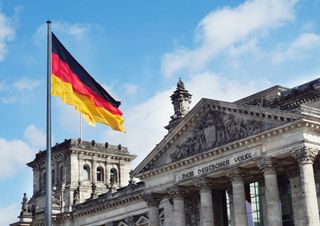
Euro 2024 is this summer: but what are the best German cities to watch football in?
If you were jammy enough to bag yourself some tickets to watch the Euros, you'll already be plotting which cities to visit. Even if you didn't, though, you might still want to consider hot-footing over to Deutschland just to soak up the atmosphere.
Germany is clean, well-organised and boasts great nightlife… oh, and it's also football-mad.
Here at FourFourTwo, we've got the complete guide, courtesy of our very own Berlin-based Ed McCambridge, here to bring you the low down on the places to be for Euro 2024. We also have a complete guide on the fan parks in each city and where you need to be when you're over for the tournament.
We also have a complete travel guide for the Euros, too, with info on costs and laws around driving across Europe, if that's something that you plan to do.
However, If you're staying in the UK, fear not: we've not forgotten you. We have a complete How to Watch guide for those watching from their sofas, while we've also compiled the full guide of the best places to see the action in London.
The best German cities to watch football in for Euro 2024
Berlin
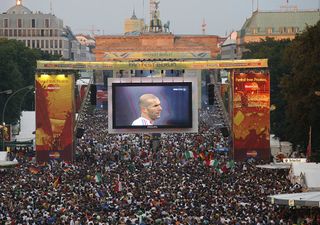
While not traditionally a heavyweight in terms of club football (lowly Hertha Berlin have generally been the mightiest side in the capital), Berlin is a must-visit during an international tournament. For one thing, its hulking Olympiastadion will be hosting a handful of matches, including one of the quarters and the final itself. For another, the city will be host to a colossal fan zone at the Brandenburg Gate, where fans can gather to drink beer, eat bratwursts and watch the action on giant screens.
Get the FourFourTwo Newsletter
The best features, fun and footballing quizzes, straight to your inbox every week.
Elsewhere, the city's pubs and beer gardens will be packed to the rafters with passionate fans, while its Spaetkaufs (what we might call corner shops or newsagents in the UK) will also come alive, offering outdoor seating, cheap bottles of beer and TVs to gather round. Besser geht's nicht!
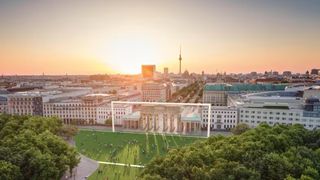
Adidas have also just announced they are creating the 'Home of adidas Football' in the city during the tournament. The 18,000 m² event space at the Platz der Republik in Berlin will offer fans a diverse sports, cultural and entertainment program with numerous digital and physical activation options as part of the UEFA Fan Zone during the European Championship. The project is being developed in close cooperation with UEFA and host city Berlin.
Opening on 14 June, expect a small stadium for matches and tournaments, a giant screen showing matches, plus food drink and more!
Munich
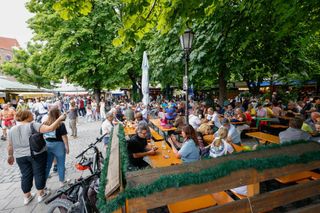
It goes without saying that Munich is worth a visit for football fans. Famed for its gothic architecture, traditional beer gardens and gastronomy, the capital of Bavaria is a picturebook city with a love for football that few can match.
Germany themselves will be kicking off their home tournament in Bayern Munich's space-age Allianz Arena, meaning party vibes are guaranteed from the off, and they're sure to return to the city once they make it out of the groups.
If you can drag yourself away from the pints for a couple of hours, the Rhine (unlike many UK rivers) has been dredged and cleaned, offers the chance for a refreshing midday dip between matches.
Munich was also the site of the tragic air disaster that claimed the lives of many of the Busby Babes in 1958, with the city honouring those who perished at "Manchesterplatz". A stone monument lists the names of those who died that day, including the legendary Duncan Edwards, making for a moving football pilgrimage of an entirely different nature.
Leipzig
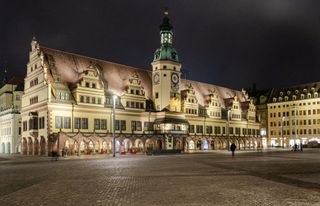
Just a short train ride from Berlin (under two hours), this stunning student town offers plenty of green spaces, cheap pints and a fun and friendly atmosphere.
Games will be played at RB Leipzig's Red Bull Arena, which was built to host matches back in 2006, including Group D's showdown between Netherlands and France on June 21 and Croatia and Italy's Group B clash on June 24. So expect high drama to be coming from the east in the early stages of the tournament.
Leipzig is the only former completely GDR city hosting games at Euro 2024 and it played a major role in the fall of communism, earning its title 'The City of Heroes' for its troubles. There is a lot of history along the cobbled streets of Leipzig, making it a cracking tourist destination aside from a tournament host.
Hamburg
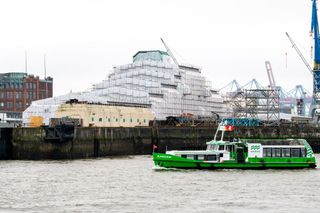
A pwopa nawty football city, is Hamburg. The northern port town, located on the river Elbe, serves as the gateway to Germany and has earned its stripes as a footballing Mecca by virtue of being home to both Hamburger SV (where Kevin Keegan once plied his trade) and lovable rogues St. Pauli.
Hamburgers are absolutely bonkers about the beautiful game and, away from the Volksparkstadion (HSV's gaff and host to several group games plus one of the quarter-finals), you'll find its cobbled avenues littered with boozers showing matches.
Down at the port itself, day trippers can marvel at the mesh of cranes and barges coming in and out of Deutschland, while further inland the notorious Reeperbahn provides enough seedy mischief to last a lifetime. Hamburg also happens to be where the young Beatles played their first European shows, giving the place a natural link to British culture.
Dortmund and Gelsenkirchen
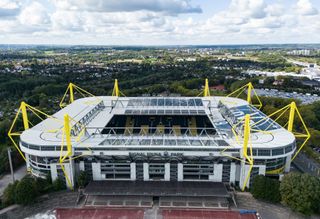
Neighbours Dortmund and Gelsenkirchen, home to Borussia Dortmund and Schalke respectively, enjoy a fierce rivalry on and off the football pitch. Just a half an hour's drive separates two towns in Germany's industrial Ruhr Valley – though some locals may wish it was more.
Ranked third in FFT's 100 best stadiums in the world last year, BVB's Westfalenstadion (the nation's largest stadium, with an 81,000 capacity), is commonly found on the bucket lists of football's romantics and rightly so – few grounds can match it for noise and passion. But Schalke's bubble dome Veltins-Arena (No.38 on our list, built for the 2006 World Cup and boasting a 62,000 capacity) is also worth a visit. Both will play host to Euro 2024 matches, with England taking on Serbia at the latter on June 16.
Dortmund and Gelsenkirchen could serve as a good hub for football fans at Euro 2024, given their proximity to one another, as well as fellow host cities Cologne, Dusseldorf and Frankfurt. Locals are known for their down-to-earth, straight-talking nature, their love of beer and, above all, their love for the beautiful game.
Cologne
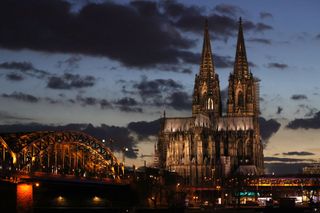
Few cities in Germany can rival Cologne for a festival atmosphere. Cologne's annual carnival – a week-long street party that starts on November 11 – is the stuff of legend, but the party never really stops in a town famed for its young population and electric nightlife.
FC Koln's 50,000-seater will play host to both Scotland and England matches, but fans who don't have tickets won't have a hard time finding good places to soak up the party vibes. There are countless bars along the riverfront serving Koelsch, a traditional local beer served in tall, thin 200ml glasses. Waiters don't ask you for a refill, they just keep them coming until you place a coaster on top. So don't expect to have any idea how much you've had to drink.
Cologne is just a stone's throw from fellow host cities Dortmund, Gelsenkirchen and local rivals Dusseldorf (a somewhat more business-oriented metropolis lying just 40km away), making it a fantastic base for anyone looking to get some ground-hopping in this summer.
Stuttgart
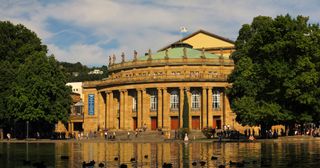
It was down in Baden-Wurttemberg, just a short drive from state capital Stuttgart that England's WAGs, including Posh, Cheryl Cole and Abbey Clancey, made headlines for all the wrong reasons in 2006. Reports of eye-watering shopping sprees, royal p*ss-ups and even drug use surfaced, with the stunning spa town of Baden-Baden forever tainted with those memories.
So, if you happen to visit Stuttgart this summer, you might expect some banter from the locals. Stuttgart is a proudly southern German town, with a slightly baffling local dialect. Food and drink might cost a little more than it does elsewhere in Deutschland but the town is visually stunning, and the locals love football just as much as anywhere else. Finding bars to watch the games in won't be an issue, and there are certain to be some big screens erected in parks and fan zones, given Stuttgart is known for its green spaces.
Stuttgart is playing host to a handful of group stage games and one of the quarter-finals. In truth, it might only make sense to visit this town if you have tickets to see games there – it is a long way from other host cities, making ground-hopping less of a breeze.
Frankfurt
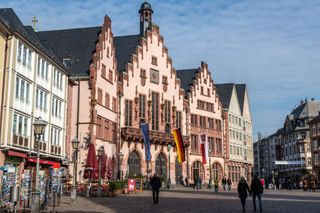
Eintracht Frankfurt's 54,000-capacity stadium will provide the backdrop to one of hosts Germany's group games (against Switzerland) as well as England vs Denmark on June 20 as well as one of the last-16 games.
The city is a modern metropolis, known for its financial district and multicultural population. Arguably, Frankfurt feels the "least German" of any city on this list but it does boast excellent transport, tonnes of bars and restaurants. It's also conveniently located near the centre of Germany, meaning it could serve as a base if you have tickets to a number of different venues across the country.
More Euro 2024 stories
Quiz! Can you name all of England's pre-tournament friendly opponents since 2010?

Thank you for reading 5 articles this month* Join now for unlimited access
Enjoy your first month for just £1 / $1 / €1
*Read 5 free articles per month without a subscription

Join now for unlimited access
Try first month for just £1 / $1 / €1

Ed is a staff writer at FourFourTwo, working across the magazine and website. A German speaker, he’s been working as a football reporter in Berlin since 2015, predominantly covering the Bundesliga and Germany's national team. Favourite FFT features include an exclusive interview with Jude Bellingham following the youngster’s move to Borussia Dortmund in 2020, a history of the Berlin Derby since the fall of the Wall and a celebration of Kevin Keegan’s playing career.